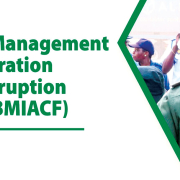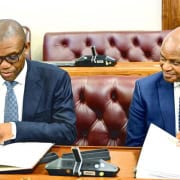|
Getting your Trinity Audio player ready...
|
In mid-November the inter-ministerial Anti-Corruption Task Team (ACTT) briefed Parliament on progress in corruption cases involving a number of government departments and entities. Present were Lieutenant-General Godfrey Lebeya and advocates Shamila Batohi, Andy Mothibi, and Xolisile Khanyile – the heads of the Hawks, National Prosecuting Authority, Special Investigating Unit (SIU), and Financial Intelligence Centre (FIC) respectively.
Lebeya chairs the ACTT AND Batohi is co-chair.
These four agencies were the only ones present of the 15 comprising the ACTT. Scopa chairperson Mkhuleko Hlengwa expressed displeasure at the dismal turnout, and requested attendance registers of all ATCC meetings as he wished to know which agencies regularly attended and which did not. He asked that the absentees be named.
- South African Police Service
- South African Revenue Service
- National Treasury
- Department of Public Service and Administration
- Department of Planning, Monitoring and Evaluation
- Public Service Commission
- State Security Agency
- Department of Co-operative Governance and Traditional Affairs
- Government Communications and Information Service – Department of Communications
- Independent Police Investigative Directorate
- Department of Justice and Constitutional Development
Hlengwa’s no-nonsense attitude was reflected in the testimony of former Scopa chairperson Themba Godi at the Zondo commission on Monday 1 February 2021, in a session focusing on Parliament’s oversight role during the state capture era.
Godi testified that in his view, Scopa was the one committee that really took its job seriously and, he added, the records would prove that it exercised its responsibilities well.
He mentioned the ACTT, saying that when Scopa called the task team, it found a sorely disorganised and dysfunctional structure which if it was focused, should have been the government’s spearhead in fighting corruption. The way many of its cases had been resolved, he said – for instance, where someone who has misused or caused the loss of millions of rands, got a five-year suspended sentence and a fine of R20 000 or R30 000 – could hardly be a deterrent to the corrupt.
Lebeya and Batohi would both address the sentencing issue in their comments to Scopa.
Prioritising cases and building capacity
Despite the poor turnout, however, Lebeya stressed that the report to be presented had been compiled by the entire ACTT, although it did not cover all activities of the ACTT.
He lamented the challenges and delays in fast tracking cases, which were caused by limited capacity in, for example, forensic, investigative and prosecutorial skills, reliance on external forensic accountants, and outdated methods and technology.
Because the ACTT needs key skills, processes were underway to secure additional capacity such as additional investigators at the Directorate for Priority Crime Investigation, and additional funding had been provided for contract appointments at the Specialised Commercial Crime Unit in the NPA. Forensic audit and accounting capacity was urgently needed.
In terms of cases referred to the ACTT, Lebeya said, the task team handled the coordination of investigations, prosecutions and recovery of assets on prioritised cases. At the time of the presentation there were 223 items on the priority case register, including 13 foreign bribery cases. This is a tremendous improvement on previous performance – in the 10 years of its existence the ACTT had finalised just 77 cases with verdicts, with a conviction rate of 89.8% of the cases. There had been nine acquittals.
Effective sentencing, he said, was internationally recognised as being a deterrent, but most cases involved either partly or wholly suspended sentences. Broadly, sentencing was at the core of redress to victims of crime and signalled the seriousness with which the State treated serious crimes. Lebeya noted that the Department of Justice and Constitutional Development was reviewing the Criminal Procedure Act, through the South African Law Reform Commission, to address the outdated provisions of the legislation and address measures to strengthen efficiency and effectiveness of the criminal justice system.
Moving to cases handed to the newly established Fusion Centre within the FIC, Lebeya explained that the centre has dedicated resources to focus on incidents of corruption and maladministration related to Covid-19 relief funds. Already 220 matters had been enrolled, with nine criminal cases and 24 accused on the court roll.
A day later, answering questions in the National Assembly, President Cyril Ramaphosa highlighted progress made by the ACTT and the 223 priority cases. He acknowledged the failings of the ACTT in the ten years of its existence and informed MPs that the work of rebuilding law enforcement institutions has been ongoing.
“This is evident in the revitalisation in the multi-agency anti-corruption task team which currently has 223 prioritised cases at different stages of investigation and prosecution,” he said.
He said much of the past two years has been focused on building up the capabilities of the institutions that the country relies on to combat corruption and state capture.
Capacity and skills shortage hampering ACTT
Batohi remarked on the failure, over the years, of the ACTT in investigating and prosecuting serious complex cases of corruption. The task of capacitating and skilling the various entities involved in the job of fighting corruption, holding people accountable and bringing back the money, had been immense.
She noted the current developments within the ACTT, but emphasised the lack of skills, especially in forensics. Despite the positive changes, the ACTT had been disrupted by the pandemic and the lockdown, but had still accomplished much work behind the scenes.
The ACTT relied on strong collaboration between participants and yet, said Batohi, there was no collaboration framework. This presented a challenge but the ACTT had been able to bring cases to court despite this.
She said that in past years, a number of cases had received suspended sentences and the most serious cases were not dealt with or sentences had been inappropriate. The sentences had to address the issues if they were to act as a deterrent. Current measures looked at cases that would have high impact. Such cases were being prioritised, tackled and resourced to make the impact that the chairperson and the country would like to see.
Batohi concluded that an investment in fighting corruption was an investment in the country and the ACTT had an obligation to show a return on that investment. If the right cases were investigated and prosecuted properly, it would have a ripple effect across the country and impact positively on investments. The Asset Forfeiture Unit was also critical in recouping money that had been stolen from the public.
The SIU’s Mothibi also focused on capacity, saying that all members of the ACTT, particularly the SIU, Hawks, NPA and FIC, required resources as part of its work was concerned with the prevention of corruption. He heads the prevention strategy and with the imminent finalisation of the National Anti-Corruption Strategy, he predicted that ACTT should soon be able to demonstrate that it was upping its game.
Khanyile explained that law enforcement agencies use FIC-generated financial intelligence to investigate and prosecute corruption and to forfeit assets. The centre’s assessment showed that there was a lot of cash in the country that could not be explained, and there were many suspicious individuals, but recovering the cash proceeds of crime was slow. She said that gaps in South African laws must be addressed, as the ACTT needed people to explain how they had come into possession of so much cash.
The FIC, she said, needed resources to be able to process the information it received on a daily basis into intelligible reports. There was no current capacity in terms of forensic auditors to turn that information into intelligence that could fight crime. FIC had the capability of generating 2 000 actionable intelligence reports but she had only two forensic accountants to deal with that mass of information.
The FIC, the NPA and the Hawks needed forensic accountants. There could be no compromise on the issue of capacity. The agents in the ACTT had spoken but did not feel that they had been heard. Conclusion was needed in terms of consolidating the anti-corruption forces.








